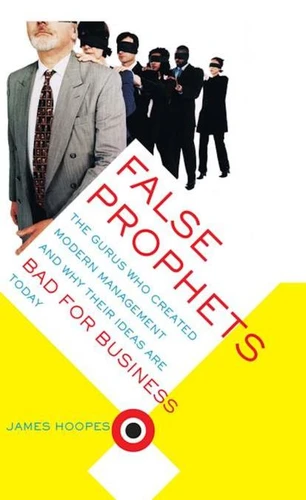False Prophets
Par :Formats :
Disponible dans votre compte client Decitre ou Furet du Nord dès validation de votre commande. Le format ePub protégé est :
- Compatible avec une lecture sur My Vivlio (smartphone, tablette, ordinateur)
- Compatible avec une lecture sur liseuses Vivlio
- Pour les liseuses autres que Vivlio, vous devez utiliser le logiciel Adobe Digital Edition. Non compatible avec la lecture sur les liseuses Kindle, Remarkable et Sony
- Non compatible avec un achat hors France métropolitaine
 , qui est-ce ?
, qui est-ce ?Notre partenaire de plateforme de lecture numérique où vous retrouverez l'ensemble de vos ebooks gratuitement
Pour en savoir plus sur nos ebooks, consultez notre aide en ligne ici
- Nombre de pages352
- FormatePub
- ISBN978-0-465-00979-4
- EAN9780465009794
- Date de parution10/10/2007
- Protection num.Adobe DRM
- Infos supplémentairesepub
- ÉditeurBasic Books
Résumé
According to Jim Hoopes, the fundamental principles on which business is based-authority, power, control-are increasingly at odds with principles of life in a democratic society-freedom, equality, individualism. False Prophets critically examines the pioneering theories of the early management thinkers, such as Taylor, Follett, Mayo, and Deming, which intended to democratize corporate life yet have proved antithetical to the successful practice of business.
Hoopes challenges popular management movements that followed in the wake of these thinkers and accuses today's business theorists of perpetuating bad management in the name of democratic values. He urges executives and managers to recognize the realities of corporate life and learn to apply the principles of power. He also unveils a new management agenda that will be of paramount significance to modern organizations.
A rich and lively read, False Prophets provides a refreshingly new and original overview of the history of management in the larger context of the American culture, brilliantly illustrating its evolution-from the ivory tower to the shop floor.
Hoopes challenges popular management movements that followed in the wake of these thinkers and accuses today's business theorists of perpetuating bad management in the name of democratic values. He urges executives and managers to recognize the realities of corporate life and learn to apply the principles of power. He also unveils a new management agenda that will be of paramount significance to modern organizations.
A rich and lively read, False Prophets provides a refreshingly new and original overview of the history of management in the larger context of the American culture, brilliantly illustrating its evolution-from the ivory tower to the shop floor.
According to Jim Hoopes, the fundamental principles on which business is based-authority, power, control-are increasingly at odds with principles of life in a democratic society-freedom, equality, individualism. False Prophets critically examines the pioneering theories of the early management thinkers, such as Taylor, Follett, Mayo, and Deming, which intended to democratize corporate life yet have proved antithetical to the successful practice of business.
Hoopes challenges popular management movements that followed in the wake of these thinkers and accuses today's business theorists of perpetuating bad management in the name of democratic values. He urges executives and managers to recognize the realities of corporate life and learn to apply the principles of power. He also unveils a new management agenda that will be of paramount significance to modern organizations.
A rich and lively read, False Prophets provides a refreshingly new and original overview of the history of management in the larger context of the American culture, brilliantly illustrating its evolution-from the ivory tower to the shop floor.
Hoopes challenges popular management movements that followed in the wake of these thinkers and accuses today's business theorists of perpetuating bad management in the name of democratic values. He urges executives and managers to recognize the realities of corporate life and learn to apply the principles of power. He also unveils a new management agenda that will be of paramount significance to modern organizations.
A rich and lively read, False Prophets provides a refreshingly new and original overview of the history of management in the larger context of the American culture, brilliantly illustrating its evolution-from the ivory tower to the shop floor.



